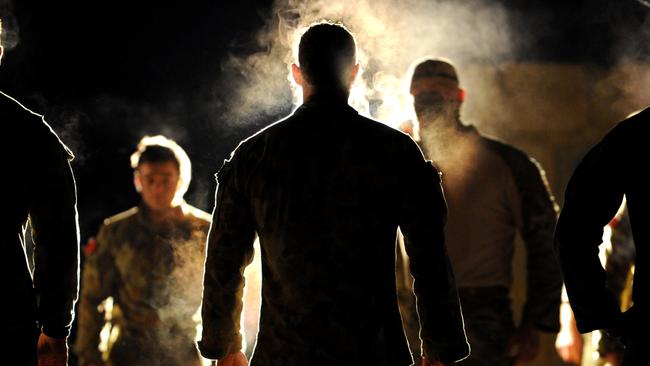Andrew Bolt: No sign of officers in Afghanistan war crimes scandal
Australian soldiers allegedly committed the worst war crimes in our living history so why has not one of their commanders been blamed, asks Andrew Bolt.
Andrew Bolt
Don't miss out on the headlines from Andrew Bolt. Followed categories will be added to My News.
What lucky army bosses! Australian soldiers commit the worst war crimes in our living history but not one of their commanders is blamed.
The buck stops with the sergeants, not the officers, who we’re told didn’t know that 25 of their men allegedly murdered 39 Afghan civilians and prisoners in cold blood.
As last week’s shocking report for the Inspector-General of our defence force put it: “The criminal behaviour of a few was commenced, committed, continued and concealed at the patrol commander level, that is, at corporal or sergeant level.”
But their officers knew nothing: “The inquiry has found no evidence that there was knowledge of, or reckless indifference to, the commission of war crimes, on the part of commanders at troop/platoon, squadron/company or task group headquarters level, let alone at higher levels such as Commander Joint Task Force 633.”
Those Joint Task Force commanders — running our Afghanistan operation from a base safely in the United Arab Emirates — “did not have the degree of command and control” over the special operations soldiers doing most of our killing and 60 per cent of our dying in combat.
Pardon? Then what did those commanders do to deserve the Distinguished Service Cross out there in Abu Dhabi for “leadership in action” while most of those 39 alleged murders were perpetrated?

Yes, the DSC was given to each of the Joint Task Force commanders from 2009 to 2013 — Mark Kelly, John Cantwell, Stuart Smith and Angus Campbell, now our Defence Force chief.
These were medals for “action” which was actually done mostly by soldiers who these commanders were — so we’re told now it’s gone wrong — “not positioned, organisationally or geographically, to influence and control”.
In which case, why not?
Why were these commanders not “positioned” to control just what was done by the special forces they relied upon to do most of the killings of the Taliban terrorists?
There was nothing more sensitive — or more likely to go wrong — in all our operations in Afghanistan than what was demanded from these soldiers, and especially our Special Air Service Regiment.
Our politicians didn’t want to get too involved in this war. Just enough to make the US grateful.
So most of the 26,000 uniformed soldiers we sent there were kept largely out of harm’s way, while the special forces were ordered out again and again “beyond the wire” to kill Taliban targets.
Do you know what it takes to spend months on end in hostile territory, where every unarmed civilian could be a Taliban spotter, and every child a suicide bomber?
Where pity can get you killed? Where your mates have died, and only your mates will save you?
Can you imagine the kind of men you need to handle such work?
So it’s no surprise that such pressure in an elite unit can produce a “warrior” mentality, particularly under a charismatic sergeant or corporal.
But who sent these soldiers out there, under such conditions? Who failed to check closely enough for signs of stress and indiscipline?
Who failed to question the high kill rates of one particular squadron, now disbanded in disgrace?
Many SAS soldiers were in fact disgusted by the murders. This inquiry would have found nothing had they not spoken out.
But it took some of them years to trust that the army would want the truth. That’s one reason this inquiry took four years to investigate.
Whose responsibility is that culture of distrust if not that of the generals?
This report, by Justice Paul Brereton, does not let off the generals and their officers completely.
Brereton said more senior commanders “bear moral responsibility and accountability for what happened”. They too easily accepted lies. Were too protective of their men.
But some soldiers say stronger stuff. Even Brereton concedes: “Many people spoke of how widespread the knowledge of wrongdoing was, making it very difficult to believe that the lack of oversight can be put down to simple disinterest.”
Former SAS sergeant Mack McCormack is more blunt: “For Angus Campbell to suggest the officers didn’t know and that this was happening on the periphery, and they weren’t aware, that is a total impossibility and that is the Officers’ Club door slamming shut on the guys who do the work.”
So let’s not turn only on a few soldiers.
This goes higher. It goes to the leaders who put men under greater pressure than almost any of us will know, and now feign shock that some cracked.



